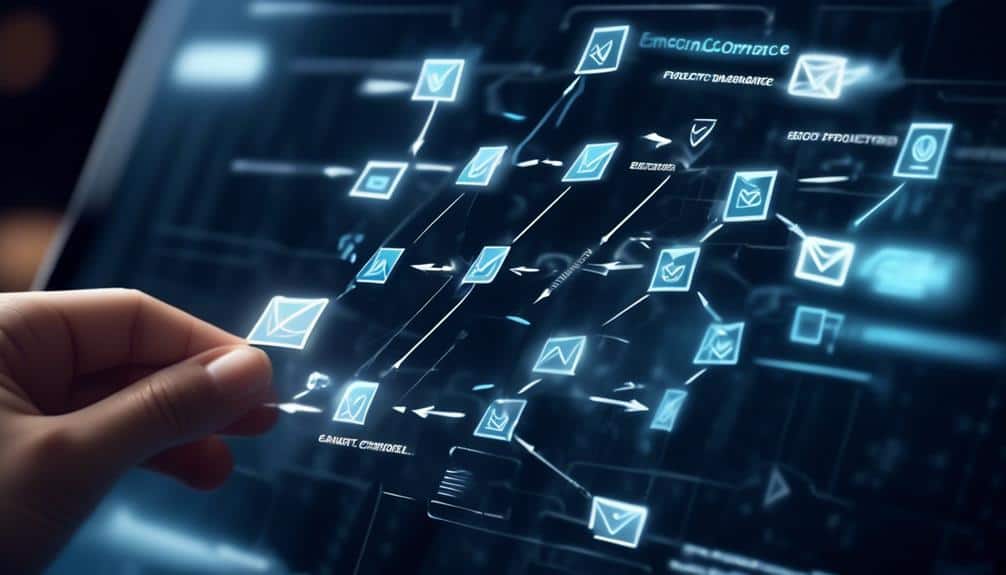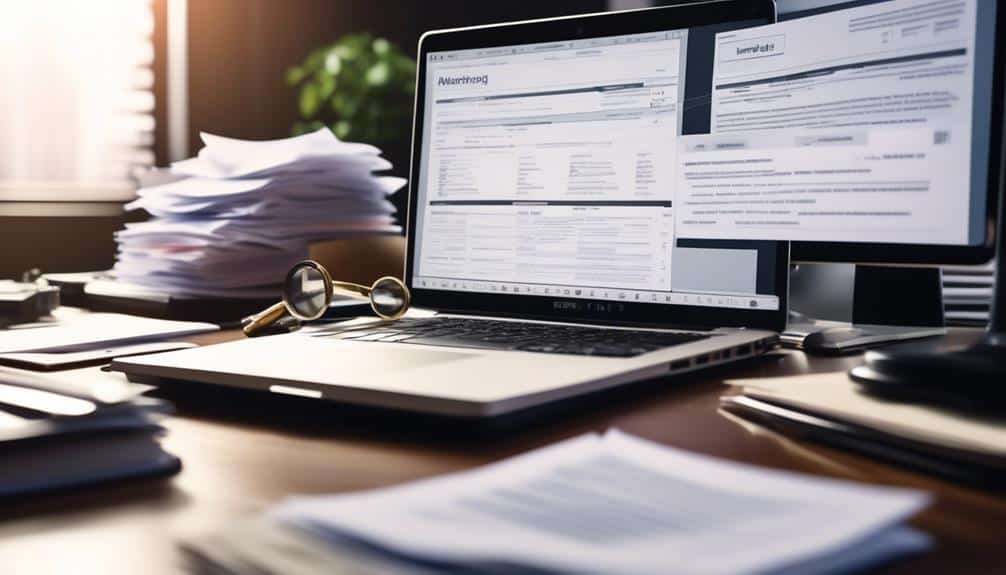Expert Advice on Navigating the Complexities of Email Compliance
They say, 'Better safe than sorry,' and when it comes to email compliance, this adage couldn't be more fitting. Navigating the complexities of email compliance can be a daunting task, with ever-evolving laws and regulations to keep up with. But fear not, for there is expert advice to help you steer through this labyrinth of rules and regulations.
In this discussion, we will explore the essential steps you need to take to ensure email compliance, from understanding the basics to implementing robust data protection measures. So buckle up and get ready to gain the knowledge and tools you need to navigate the intricacies of email compliance like a pro.
Key Takeaways
- Familiarize yourself with relevant regulations and laws governing email communication, such as the CAN-SPAM Act and GDPR.
- Implement robust email security measures, including encryption and strong passwords.
- Regularly monitor and audit email communications to identify compliance issues.
- Establish clear email policies and procedures within your organization.
Understand Email Compliance Basics

To ensure compliance with email regulations, you must have a clear understanding of the basics. Email compliance challenges can be daunting, but with the right knowledge, you can navigate them successfully. Here are some email compliance tips to help you stay on the right side of the law.
First and foremost, familiarize yourself with the relevant regulations and laws governing email communication. This includes understanding laws such as the CAN-SPAM Act and the General Data Protection Regulation (GDPR). Stay updated on any changes or updates to these regulations to ensure ongoing compliance.
Next, implement robust email security measures to protect sensitive information. This includes using encryption and strong passwords, as well as regularly updating your security software.
Furthermore, establish clear policies and procedures regarding email usage within your organization. Train your employees on these policies to ensure they understand their responsibilities and the importance of compliance.
Regularly monitor and audit your email communications to identify any potential compliance issues. This can help you address them promptly and avoid any legal repercussions.
Lastly, consider working with a professional email compliance consultant or legal advisor. They can provide expert guidance and help you navigate the complexities of email compliance effectively.
Familiarize Yourself With Relevant Laws and Regulations
To ensure email compliance, it's crucial for you to familiarize yourself with relevant laws and regulations.
This includes understanding the legal requirements for emails, such as the need to obtain consent for sending marketing emails and the obligation to include an opt-out option.
Additionally, compliance with data protection laws is essential to protect the privacy and security of personal information.
Legal Requirements for Emails
Familiarize yourself with the relevant laws and regulations to ensure email compliance. Understanding the legal requirements for emails is crucial to avoid potential legal consequences and ensure proper email retention.
Different countries have specific laws regarding email communications, such as the General Data Protection Regulation (GDPR) in the European Union, which mandates the protection and privacy of personal data. In the United States, there are laws like the CAN-SPAM Act, which regulates commercial email messages and requires certain information to be included in them.
Additionally, some industries, such as healthcare and finance, have specific regulations like HIPAA and FINRA that govern email communication within those sectors.
Compliance With Data Protection
Understanding the relevant laws and regulations is crucial for ensuring compliance with data protection in email communication. To navigate the complexities of email compliance, familiarize yourself with the following:
- Data breach notification: Be aware of your obligations to report any unauthorized access or disclosure of personal data. Understand the requirements for notifying affected individuals and relevant authorities in a timely manner.
- Data retention: Determine the appropriate timeframes for retaining email data based on legal requirements and business needs. Implement policies and procedures to securely store and dispose of data when it's no longer necessary.
- Encryption and security: Implement robust security measures to protect sensitive information transmitted via email. Consider using encryption technologies to safeguard data from unauthorized access.
Understanding Industry Regulations
Ensure compliance with relevant laws and regulations by gaining a thorough understanding of industry regulations. Familiarize yourself with the specific industry standards that apply to your organization's email communication.
Email compliance challenges can arise from various sources, including government regulations, industry-specific guidelines, and international data protection laws. It's crucial to stay up to date with any changes or updates to these regulations to avoid potential legal issues and penalties. By understanding industry regulations, you can proactively implement the necessary measures to protect sensitive information, prevent data breaches, and maintain the trust of your customers.
Additionally, it's essential to regularly review and assess your organization's email compliance practices to ensure they align with current industry standards and best practices.
Establish Clear Email Policies and Procedures
To establish effective email policies and procedures, prioritize clarity, consistency, and accountability. By establishing guidelines and creating protocols, you can ensure that all employees understand and follow the proper procedures when it comes to email communication. Here are three key steps to consider:
- Clearly outline acceptable email use: Set clear expectations for employees regarding the appropriate use of company email. Define what's considered acceptable and unacceptable behavior, including guidelines for personal use, confidentiality, and data protection.
- Implement consistent email retention and archiving policies: Establish a system for retaining and archiving emails in accordance with industry regulations and legal requirements. Clearly communicate these policies to all employees and provide guidance on how to properly store and manage email records.
- Foster a culture of accountability: Hold employees accountable for their email communications by implementing regular monitoring and auditing processes. This ensures that employees are adhering to the established policies and procedures and helps identify any potential compliance issues.
Obtain Explicit Consent From Subscribers

When obtaining explicit consent from subscribers, it's essential to clearly communicate the purpose and terms of email communication. Consent management plays a crucial role in email compliance, and it's important to follow opt-in requirements to ensure that subscribers have given their explicit consent to receive emails from your organization.
To obtain explicit consent, you need to provide subscribers with a clear and concise explanation of why you're collecting their email addresses and how you'll be using their information. This can be done through a simple opt-in process where subscribers actively choose to receive emails from you. Make sure the opt-in checkbox isn't pre-selected, as this goes against the principles of explicit consent.
Additionally, consider using a double opt-in process, where subscribers confirm their email address and consent to receive emails by clicking on a verification link sent to their inbox. This adds an extra layer of protection and ensures that subscribers are fully aware of their consent.
Remember that explicit consent is an ongoing process, and subscribers should have the ability to easily withdraw their consent at any time. Provide clear instructions on how subscribers can opt-out of receiving emails, and respect their preferences promptly.
Implement Robust Data Protection Measures
To implement robust data protection measures for your email compliance, there are several key points to consider.
First, encryption is crucial for ensuring secure communication and protecting sensitive information.
Additionally, staying up to date with privacy regulations and compliance requirements is essential to avoid legal issues.
Lastly, providing comprehensive employee training and raising awareness about data protection will help strengthen your overall security measures.
Encryption for Secure Communication
Implement robust data protection measures by utilizing encryption for secure communication. Encryption ensures that your email messages are protected from unauthorized access, keeping your sensitive information safe.
Here are three key points to consider when implementing encryption:
- Secure Email Protocols: Use secure email protocols such as Transport Layer Security (TLS) or Secure Sockets Layer (SSL) to encrypt the connection between your email client and the mail server. This prevents eavesdropping and ensures the confidentiality of your communication.
- Secure Email Gateways: Deploy secure email gateways that can automatically encrypt outgoing email messages based on predefined policies. This helps ensure that sensitive information is always protected, regardless of user error.
- End-to-End Encryption: Consider implementing end-to-end encryption, where only the sender and recipient can decrypt and read the email messages. This provides an additional layer of security, even if the email is intercepted during transit.
Privacy Regulations and Compliance
Ensure robust data protection measures are in place to comply with privacy regulations and maintain compliance. Privacy breaches can have severe consequences, including reputational damage, financial loss, and legal penalties.
To protect sensitive information in emails, it's crucial to prioritize email security. Implementing encryption protocols can safeguard the content of emails and prevent unauthorized access. Additionally, user authentication measures, such as two-factor authentication, can add an extra layer of protection.
Regularly updating and patching email software and systems is also essential to address any vulnerabilities and stay ahead of potential threats. Conducting regular audits and assessments can help identify any weaknesses in current data protection measures and enable necessary improvements.
Employee Training and Awareness
With the importance of data protection in mind, it's crucial to equip employees with the necessary training and awareness to effectively safeguard sensitive information in emails. To achieve this, consider the following measures:
- Conduct regular training sessions: Provide employees with comprehensive training on email security best practices, including how to identify phishing attempts, create strong passwords, and securely handle attachments.
- Promote a culture of cybersecurity: Foster employee engagement by promoting a culture of cybersecurity awareness. Encourage employees to report suspicious emails or potential security breaches promptly.
- Enhance internal communication: Regularly communicate updates and reminders about email compliance policies and procedures. Use various channels such as emails, newsletters, and team meetings to ensure that employees stay informed and engaged.
Conduct Regular Audits and Assessments
Regular audits and assessments are essential for maintaining email compliance. To ensure that your organization is meeting regulatory requirements and industry standards, it's crucial to conduct regular monitoring and compliance audits.
Regular monitoring allows you to proactively identify any potential compliance issues before they escalate. By closely monitoring email communications, you can detect unauthorized access, data breaches, or non-compliant behavior. Implementing regular monitoring processes provides a proactive approach to email compliance, helping you address any issues promptly and effectively.
In addition to regular monitoring, conducting compliance audits is essential. These audits assess your organization's compliance with relevant laws, regulations, and internal policies. They help identify any gaps or weaknesses in your email compliance program and provide insights into areas that need improvement.
During compliance audits, you can review email policies and procedures, ensure proper email retention and archiving, and assess the effectiveness of your training and awareness programs. These audits also provide an opportunity to evaluate the security measures in place to protect sensitive information shared through email.
Train Your Staff on Email Compliance Best Practices

To effectively ensure email compliance within your organization, it's crucial to provide comprehensive training on best practices to all staff members. By equipping your employees with the knowledge and skills necessary to navigate email compliance challenges, you can minimize the risk of non-compliance and potential legal consequences.
Here are some key steps to consider when implementing email compliance measures:
- Develop a training program: Create a structured training program that covers the basics of email compliance, including the importance of data privacy, confidentiality, and regulatory requirements. Make sure to tailor the training to different roles and departments within your organization.
- Provide ongoing education: Email compliance best practices evolve over time. Therefore, it's essential to offer regular updates and refresher courses to keep your staff up to date with the latest regulations and guidelines.
- Foster a culture of compliance: Encourage a culture of compliance within your organization by promoting open communication, emphasizing the importance of following email compliance policies, and providing channels for employees to report any concerns or violations.
Keep Records and Documentation in Order
Maintain organized and up-to-date records and documentation to ensure email compliance within your organization. Record retention and documentation management are crucial aspects of email compliance. By keeping comprehensive records, you demonstrate transparency and accountability, enabling your organization to meet legal and regulatory requirements.
To effectively manage your records, establish a clear system for categorizing and organizing emails. Implement a consistent naming convention and folder structure, allowing for easy retrieval and retrieval. Regularly review and update your record retention policy to align with evolving regulations. This ensures that you retain emails for the required duration and dispose of them appropriately when no longer needed.
Implementing a robust documentation management system is equally important. Invest in a reliable email archiving solution to automatically capture and store all inbound and outbound emails. This eliminates the risk of emails being deleted or modified, ensuring their integrity and authenticity.
Furthermore, document any changes or updates made to email policies or procedures. This includes training materials, communication records, and incident reports. By maintaining comprehensive documentation, you can demonstrate your commitment to email compliance and provide evidence in case of an audit or legal dispute.
Monitor and Stay Updated on Changes in Email Compliance Regulations

To ensure ongoing email compliance within your organization, it's essential to stay vigilant and informed about any changes in email compliance regulations. Monitoring compliance changes and staying updated on industry updates will help you stay ahead and ensure that your organization is always in compliance. Here are three key reasons why monitoring compliance changes is crucial:
- Legal Compliance: Email compliance regulations are constantly evolving, and failure to stay updated can lead to legal consequences. By monitoring compliance changes, you can ensure that your organization is adhering to the latest regulations and avoid potential penalties or lawsuits.
- Data Security: Email compliance regulations are designed to protect sensitive information and prevent data breaches. Staying updated on changes in email compliance regulations allows you to implement necessary security measures to safeguard your organization's data and confidential information.
- Reputation Management: Compliance breaches can damage your organization's reputation and erode customer trust. By monitoring compliance changes, you can proactively address any potential compliance issues and demonstrate your commitment to data protection, enhancing your organization's reputation.
Staying informed about changes in email compliance regulations is essential for maintaining the security and legal compliance of your organization. Regularly monitoring compliance changes and industry updates will help you stay ahead of the curve and ensure ongoing email compliance.
Frequently Asked Questions
What Are the Potential Consequences if My Organization Fails to Comply With Email Regulations?
If your organization fails to comply with email regulations, there can be severe consequences. It is crucial to prioritize education and training to avoid legal penalties, reputational damage, loss of customer trust, and potential financial losses.
How Can I Ensure That My Organization's Email Policies Align With All Relevant Laws and Regulations?
To ensure your organization's email policies align with relevant laws and regulations, consider seeking expert advice on best practices. This will help you navigate the complexities of email compliance and avoid potential legal implications.
Are There Any Specific Guidelines for Obtaining Explicit Consent From Subscribers in Email Marketing Campaigns?
To obtain explicit consent from subscribers in email marketing campaigns, follow these guidelines: clearly explain why you are collecting their information, provide an opt-in option, use a double opt-in process, and include an easy way to unsubscribe from future emails.
What Are Some Recommended Data Protection Measures That Can Be Implemented to Enhance Email Compliance?
To enhance email compliance, you should implement email encryption and data retention policies. These measures will help protect sensitive information and ensure that you are meeting the necessary requirements for email compliance.
How Often Should Regular Audits and Assessments of Email Compliance Be Conducted, and What Should They Entail?
Regularly conduct audits and assessments to ensure email compliance. Follow best practices and industry standards. Assess the effectiveness of data protection measures, review policies and procedures, and identify any areas of non-compliance.
Conclusion
To navigate the complexities of email compliance, it's crucial to have a strong understanding of the basics. This includes familiarizing yourself with relevant laws and regulations, establishing clear policies and procedures, obtaining explicit consent from subscribers, implementing robust data protection measures, conducting regular audits, training your staff, and keeping records in order.
Additionally, staying updated on changes in email compliance regulations is essential for maintaining compliance in the ever-evolving digital landscape.








